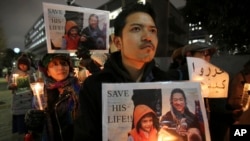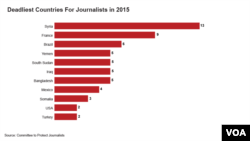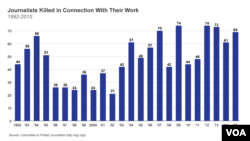The Committee to Protect Journalists says 2015 was one of the deadliest years on record for members of the press worldwide, with 69 journalists killed on-assignment. According to the CPJ, 2015 was the sixth year out of the last ten (and eighth since 1992) in which more than 60 journalists were killed in the line of duty—a figure that includes those targeted for their profession as well as those killed in combat, crossfire or while covering other assignments deemed dangerous.
For the fourth consecutive year, the death toll among journalists in Syria topped CPJ’s 2015 list—a figure currently at 13, and a steep decline from previous years: 31 journalists were killed in Syria in 2012; 29 and 17 were killed in 2013 and 2014, respectively.
However, the number alone does not tell the complete story. CPJ reports that the declining deaths in Syria can be attributed, in part, to the reduced number of journalists working in the country—both as a decision among international news organizations not to send reporters to the country and among local journalists to flee into exile.
In addition, there are cases throughout the region in which journalists are either missing or whose deaths could not be confirmed.
“It’s really challenging to investigate the killings of journalists in places like Iraq, like Syria, where there are such high levels of violence and so little information coming out,” said CPJ’s Advocacy Director, Courtney Radsch in an interview via Skype.
In Mosul, Iraq, CPJ investigated 35 cases of journalists reported either missing, dead, or held captive by the so-called Islamic State. However, CPJ could confirm the deaths of only “a handful.”
France joins the list
Of the 69 journalists killed in 2015, 28—or roughly 40%—came at the hands of Islamic militant groups including Islamic State and al-Qaida. Nine were killed in France: eight at the office of the satirical magazine Charlie Hebdo on January 7, and one (43-year-old freelance journalist Guillaume B. Decherf) who was reporting on a concert at the Bataclan Theater in Paris when gunmen attacked on November 13.
CPJ Secretary-General Christophe Deloire told VOA the real surprise in this year's figures is not that many lost their lives in the Middle East, but that so many were killed as a result of the assault on the offices of Charlie Hebdo in Paris.
Radsch says that despite the spread of technology, which has enabled more people to practice journalism, there is still a “privileged role” that professional journalists play, as evident in the case of the slain Charlie Hebdo cartoonists. She said journalists are at risk in their newsrooms, wherever they may be.
“They are pushing red lines, they are pushing social boundaries,” said Radsch. “We also have to recognize that the response to those attacks also puts journalists at risk.”
Worldwide, CPJ revealed that more than two thirds of the journalists killed this year were singled out for murder “in reprisal for their work,” a statistic which the organization reports as “in line” with the historical average, but a greater percentage in comparison to the previous five years.
High censorship
CPJ’s advocacy director said its latest report on journalists killed is part of a larger narrative regarding worldwide freedom of the press, which she said remains under pressure.
In a separate report, CPJ said that in many countries, including Iran and Egypt, journalists are not being killed, but imprisoned, which translates into high levels of censorship.
In additional 2015 findings, CPJ reported that at least 28 murder victims received threats before they were killed. The most common “beat” topics covered by victim journalists were politics, war, and human rights.
(Victor Beattie contributed to this report from Washington)










